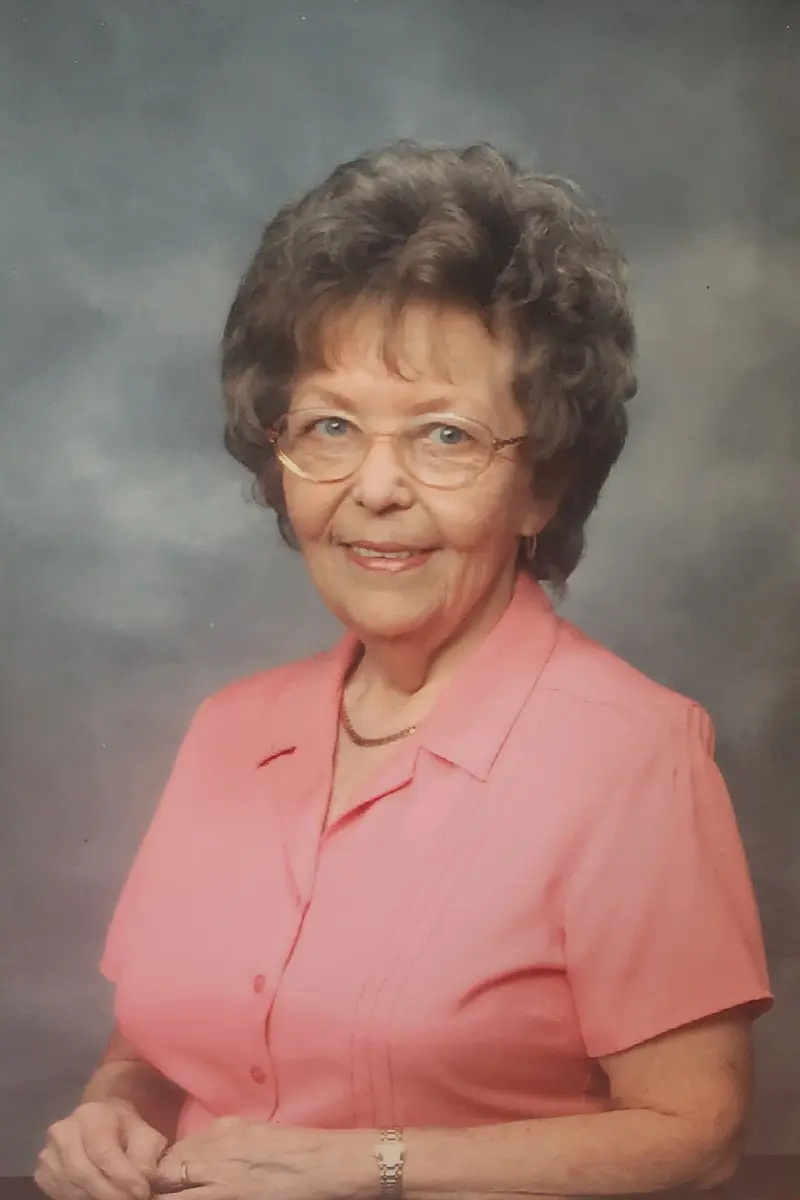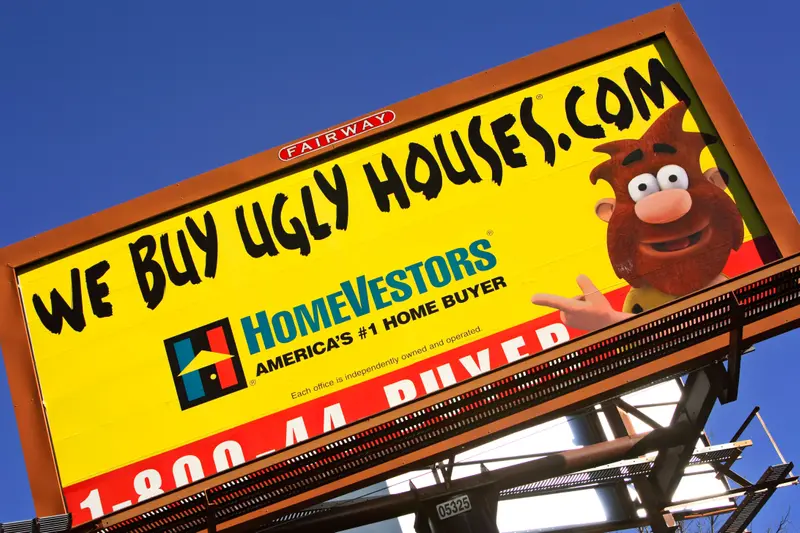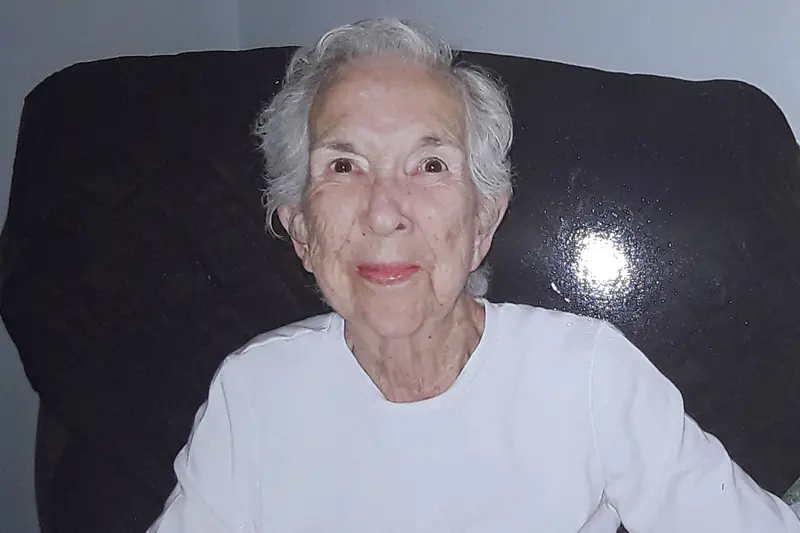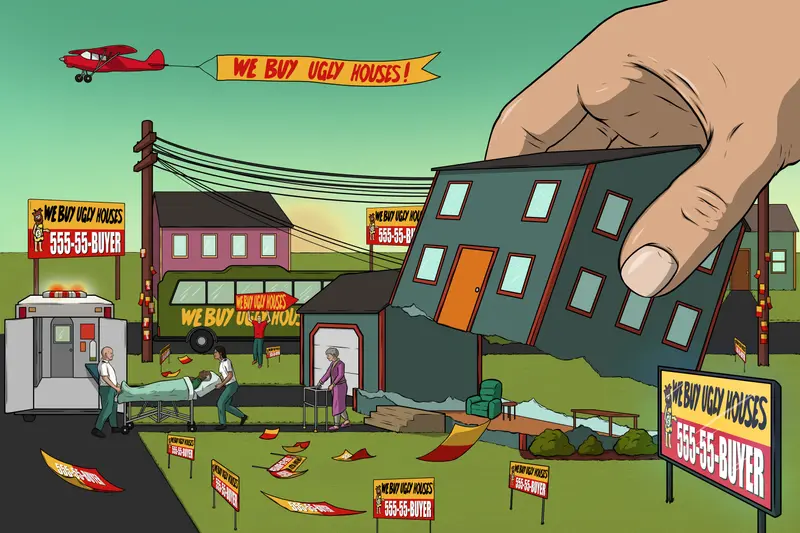Cory Evans was well-versed in the HomeVestors of America playbook when he arrived at a suburban Los Angeles home on Nov. 4, 2016. His franchise with the “We Buy Ugly Houses” company had executed more than 50 deals in the preceding two years. Patriot Holdings would soon become one of the company’s most successful franchises by following HomeVestors’ strategy of finding homeowners in desperate situations, then convincing them to sell quickly.
The homeowner, Corrine Casanova, had bought the three-bedroom Baldwin Park bungalow with her husband in 1961 and now owned it outright. After raising three children there, she was days away from leaving it for an assisted living facility and had called the number on a HomeVestors ad.
“I was wondering if I could get an estimate of the value of my home,” she told the woman who answered the phone. “My husband’s gone, so it’s just me now.”
Evans, who ran the business with three of his brothers, had developed a reputation among other franchisees in the area as a “hard closer.” Casanova’s house was paid off, giving Evans room to go low with his offer because there wasn’t a mortgage to settle. He calculated the profit he wanted to make and presented Casanova with a 10-page purchase agreement during the short visit to her house.
But Casanova was incapable of engaging in a complex negotiation. Although she was once a skilled bookkeeper and president of the local women’s club, dementia now carved into her short-term memory: A recent neurological assessment had found the 82-year-old was unable to say what year it was or name the city she was in. She routinely mistook her adult son for his uncle.

HomeVestors cautions its franchisees never to take advantage of sellers who are unable to understand negotiations. But by the time he left that evening, Evans had a contract to buy the house for roughly two-thirds its value, signed in Casanova’s shaky script.
Highlights From This Series
Weeks passed before Casanova’s family learned of the sale. But her son, David Casanova, soon sensed something was wrong.
“After we moved her, she kept saying, ‘I need to call my friend. I need to call my friend.’ And I'm like, ‘Which friend, Mom?’” David told ProPublica.
Corrine couldn’t remember.
After David learned of the contract, he explained to Evans that his mother had dementia and tried to cancel the sale. Instead of walking away, Evans dug in, recording a notice on the property’s title that essentially prevented a sale to anyone else, which forced the Casanova family into a years-long battle to keep the home. Along the way, Evans disputed that Casanova showed signs of impairment during their interactions.
HomeVestors of America boasts that it helped pioneer the real estate investment industry. Founded in 1996 by a Texas real estate broker, the company has developed a system for snapping up problem properties — and expanded it to nearly 1,150 franchises in 48 states.
Unlike real estate agents, house flippers operate in a largely unregulated space. Real estate agents have a fiduciary responsibility to represent a homeowner’s best interests in negotiations, which is defined in state laws, licensing requirements and an industry code of ethics. But in most states, flippers don’t need a license.
HomeVestors, the self-proclaimed “largest homebuyer in the United States,” goes to great lengths to distinguish itself from the hedge funds and YouTube gurus that have taken over large swaths of the real estate investment market. The company says it helps homeowners out of jams — ugly houses and ugly situations — improving lives and communities by taking on properties no one else would buy. Part of that mission is a promise not to take advantage of anyone who doesn’t understand the true value of their home, even as franchisees pursue rock-bottom prices.

Treat every customer like they’re your 85-year-old grandma who’s never done a real estate deal, HomeVestors trainers tell franchise owners at annual conferences.
But a ProPublica investigation — based on court documents, property records, company training materials and interviews with 48 former franchise owners and dozens of homeowners who have sold to its franchises — found HomeVestors franchisees that used deception and targeted the elderly, infirm and those so close to poverty that they feared homelessness would be a consequence of selling.
One HomeVestors franchisee falsely claimed to a 72-year-old woman suffering from a hoarding problem that city code enforcement officers would take her house, according to court documents. An Arizona woman said in an interview that she was forced to live in her truck after trying unsuccessfully to cancel the sale of her home. One court case documented the plight of an elderly man in Florida who was told if he sold his condo he could continue living there temporarily. But he spent his final days alive waiting to be evicted when — after the contract was signed — the franchise owner informed him the homeowners association rules didn’t allow it.
“You were always lying to them. That’s what we were trained,” said Katie Southard, who owned a franchise in North Carolina. “There was a price that you could pay, but you would always go lower and tell them that was the price you could pay.”
Even when homeowners believed they were being taken advantage of and tried to back out of deals, franchise owners sued or filed paperwork to block a sale to another buyer. Some homeowners fought from hospital beds to keep their properties. At least three died shortly after signing sales contracts; a fourth died after three years of worrying about money. Their families told ProPublica that they are convinced the stress of losing their houses contributed to their loved ones’ deaths, though all had been ill or infirm.
A HomeVestors spokesperson said the deals uncovered by ProPublica represent a tiny fraction of the company’s overall transactions, which have totaled more than 71,400 since 2016. She denied the company had targeted the elderly and pointed to a 96% approval rating among homeowners who sell to HomeVestors, which was calculated internally from what the company says was “over 500” customer reviews. The company had already taken action in some of the cases found by ProPublica, she added, and is investigating others in light of the reporting.
Within days of receiving questions from ProPublica, HomeVestors prohibited its franchises from recording documents to prevent homeowners from canceling sales and discouraged them from suing sellers. The practices not only affect the seller, the company noted, it creates a paper trail that reporters and prosecutors can follow to a franchise’s doorstep.
“If you are doing this on a serial basis, you're putting the entire system at risk,” HomeVestors’ general counsel, Anthony Lowenberg, said during a national call on April 18 to alert franchise owners to ProPublica’s upcoming story.
During that call, a recording of which was obtained by ProPublica, company leadership acknowledged the depth and thoroughness of the news organization’s investigation and discussed changes to ensure “our franchises are doing the right things.”
“This is going to make us a better company,” HomeVestors CEO David Hicks concluded.
How They Find You
HomeVestors has worked hard to ensure it is a household name, with ubiquitous advertising on billboards, mailers, television and the internet. The company has trademarked dozens of images and phrases, including “The Good, the Bad and the Ugly” and “Ugly Opportunities,” and frequently goes after imitators in court. Its cartoon caveman, “Ug,” offers a friendly smile and sometimes holds out a bag of cash implying he’s ready to help homeowners out of “Ugly Situations.”
HomeVestors deploys Ug strategically. You’ll find him on ads near homes slammed by hurricanes or charred by wildfires. He’s on mailers blanketing ZIP codes with a high concentration of homeowners who have lots of equity. He’s on postcards sent to people that public records indicate have recently divorced or had a death in the family. To family members trying to navigate probate, HomeVestors promises: “We can help.”

In recent years, scores of homeowners have complained to local authorities and the Federal Trade Commission about HomeVestors’ ceaseless overtures — sometimes claiming that the company has ignored formal requests to stop. A Texas resident whose father had recently been murdered told ProPublica that HomeVestors wouldn’t take no for an answer. The letters were so persistent, she said, that checking her mail became a traumatic experience.
A HomeVestors spokesperson said the company addresses each complaint it receives and adds people to an internal “do not call” list when they ask not to be contacted.
HomeVestors also casts its net online, hoping to reach homeowners before they talk to a real estate agent or another investor.
In an interview, a former employee of the ad agency hired by HomeVestors recalled discussions about how to serve online ads to people in the vicinity of nursing homes and rehabilitation hospitals. The goal was to catch families who needed to sell assets so Medicaid would pay their nursing home costs. The employee, who asked not to be named because they still work in the industry, also recalled the agency’s owner bragging about the ability of its digital advertising to find an elderly person who had broken a hip. That injury, the employee reported the owner saying, is effectively a 60-day countdown to death — and, possibly, a deal.
“If we can get in front of people at that point, that was like a definite way to go,” the former employee said. “Yeah, that was bad. My stomach hurts thinking about that.”
A spokesperson for the ad agency, Imaginuity, said it would be “out of character” for the owner to “disrespect or wish harm” to a client’s customers.
A HomeVestors spokesperson admitted that the company had used such ad-targeting technology but said it only did so once, more than four years ago. A spokesperson for Imaginuity said the pilot project did not target rehabilitation centers.
Still, HomeVestors’ franchisees are taught ways to find people moving into a nursing home.
Up to half of a franchise’s prospects must be generated by its own legwork, what HomeVestors refers to as “dig leads.” The company’s training manual teaches franchisees to build relationships with those who interact with people in difficult situations: nursing home administrators, probate officers, divorce lawyers. It also instructs them to comb neighborhoods for clues of distress — water shutoff notices, police tape, boarded-up windows, burn scars — and pounce on signs of desperation. If a family’s belongings are on the curb, for example, the directive is clear: “Quickly pursue the property where the trash pile indicates eviction.”
In a written statement, the HomeVestors spokesperson initially denied the company targets homeowners based on such life events as a death, divorce or moving to a nursing facility. After ProPublica pointed to company advertising documents and training materials that teach such tactics, the spokesperson said they represent a small fraction of its marketing budget. The company also denied targeting homeowners based on demographics, including age. Rather, the company focuses on smaller, older properties that may be in need of repair, the spokesperson said.

For all of its scrupulous image management, the company has at times described its targets in crude terms. Certain homes in its advertising crosshairs are referred to internally as “honeypots.” And in a 2020 interview, Hicks said houses targeted by his company smell so bad flippers want to take a shower after visiting them.
“That cat piss smell, you know what that smell is?” he said with a chuckle. “That’s money.”
Hicks declined a request for an interview.
“It Wasn’t Just One Bad Actor”
HomeVestors requires that amid the rush to find desperate homeowners and make a deal, its franchisees not engage in “underhanded methods that cheapen and risk their businesses.”
It teaches them to be clear that they are a “discount buyer,” unable to pay full price, and that the seller will instead get speed and convenience. It explicitly forbids them from lying. “A franchisee shall not knowingly make any false statements or claims concerning property value, market conditions or any other matter concerning real property to any property owner in order to influence that person’s decision to sell,” the handbook reads.
But owning a HomeVestors franchise is expensive. In addition to fees and commissions paid to the company, franchisees are required to pay hefty sums — often tens of thousands of dollars a month — to support marketing. A team of corporate auditors works to ensure no fee is delinquent. Such financial pressures can lead to desperation for deals, which in turn can lead to unethical behavior, according to former franchisees.
ProPublica found a pattern of HomeVestors flippers facing allegations they stretched the truth or deceived homeowners in pursuit of deals.
A woman in Fort Worth, Texas, said in an interview a franchisee told her she could legally sign a contract to sell her late husband’s house even though she wasn’t on the deed. A man in Broward County, Florida, believed he was signing a document for a home equity loan that in reality was a contract to sell his $100,000 house for $37,500, according to a lawsuit he filed but ultimately abandoned. (HomeVestors’ spokesperson said the document was labeled a contract for sale.) A woman in Arizona said in an interview she was told her late mother’s home in a popular outdoor recreation town would have to be torn down and rebuilt to fetch a fair price. After paying her $10,000, the HomeVestors franchise sold it for $55,000 without making any improvements.
“It wasn’t just one bad actor,” said a former California franchise owner who spoke anonymously because they feared retribution from HomeVestors. “It became pervasive in the culture.”
HomeVestors’ spokesperson said such behavior isn’t taught or tolerated, and when it’s found, “we aim to take swift action up to and including termination of a franchise.” She added that “lying is against our code of ethics and our culture.” The spokesperson would not name which franchises or even how many have been terminated for violating company standards. ProPublica found HomeVestors bestowed awards on eight franchise owners in the last two yearswho had engaged in behavior the company said is not tolerated.
In its training manuals and at its annual conferences — boisterous affairs where franchise owners pose for photos with Ug and one flipper wore a suit printed with $100 bills — HomeVestors teaches the Sandler system. Central to this sales strategy is building rapport with homeowners in order to “find the pain.”
“Pain is always a form of motivation,” the training manual reads. “Once you find the Seller’s pain, you have a much better chance of buying the house.”
Among the circumstances that can generate a fast sale: a lost job, a looming foreclosure or a child in need of surgery. One former franchisee described how he found a potential Atlanta seller’s pain by asking the homeowner why he needed to sell so fast. The answer: His mother was living out her final days in hospice 1,400 miles away.
“It’s not because they want to sell the house,” the former franchisee said. “It’s because they want to get to Colorado to see their dying mother.”
“I Will Never Sell to You”
About two months after Corrine Casanova accepted Evans’ offer, her son paid for an appraisal.
Corrine’s wasn’t one of the ugly houses mythologized in the company’s ads. The appraiser deemed it “reasonably maintained,” noting recent improvements to the plumbing, bedrooms, sewer line and exterior stucco. The appraisal put the home’s value at $440,000, $165,000 more than Evans had offered.
Over the years, the Casanovas had poured time and energy into modest improvements: A driveway, which David and his father had repaved in the 1980s, was still in good shape; a new oak floor had cost roughly $7,000 about 13 years ago. As a teenager, David worked an after-school job for his father, testing diodes and semiconductors in the house’s garage. His mother, who kept meticulous records of the family’s finances, would cut him company checks in lieu of an allowance.
“They drilled that into us when we were little,” David Casanova said. “If you want something, you work for it, you save and you purchase it.”
While David was initially unaware his mother had agreed to sell, he did know she was vulnerable and had tried to protect her. David’s father, before he passed away in 2014, warned David that Corrine’s condition was worse than it appeared — that she could fake it “real good for about five minutes” before symptoms of her dementia would become evident. By 2016, her health had deteriorated to the point that she needed full-time care. She had come to believe she was a teenager again, living in the 1950s, David said.
HomeVestors’ training materials are unequivocal about how to treat potential sellers whose abilities may be diminished: “A Franchisee shall not purchase real property from any person whom the Franchisee knows or has reason to suspect is subject to a guardianship or has a mental capacity that is diminished to the point that the person does not understand the value of the property.”
Yet records show a pattern of disregard for that directive.
In 2020, a 78-year-old man in Atlanta was convinced to sign a sales contract for $97,000, about half what it later sold for. Eight weeks later, a cognitive exam showed he was unable to write a sentence or name the year, season, date or month, according to a lawsuit that is still pending. (The franchisee told ProPublica the man appeared in full command of his faculties, and HomeVestors said the franchise is no longer part of the company.)
That same year, a 77-year-old woman in Glendale, Arizona, who could no longer manage her finances signed a contract to sell her house for under half what it was worth, according to court documents. In the ensuing fight to save her house, the woman attended a court hearing remotely from her hospital room. (A HomeVestors spokesperson said the lawsuit was not initiated by a franchise but rather another investor who bought the sales contract from the franchise. The spokesperson, however, did not comment on the franchise owner’s interactions with the elderly homeowner. The business is no longer a HomeVestors franchise, she said. The lawsuit was settled in bankruptcy court.)
And in 2021, the lawyer for an elderly man in California accused a franchisee of taking advantage of the man’s “weakness of mind due to age” to convince him to sell his house for $175,000 below market value. (A HomeVestors spokesperson said the company was unaware of this case and has since sent a letter informing the franchisee it may be in violation of its franchise agreement for not disclosing the litigation. The case was settled out of court.)
Martha Swanson, an 83-year-old Georgia woman who had suffered a series of small strokes, sold her house to a HomeVestors franchise for $82,111, then spent the last three years of her life agonizing over money, including how to pay the $3,000-a-month cost of her assisted living center.
“That’s just not ethical,” her daughter, Sherry Nixon, told ProPublica.
In Swanson’s case, the franchise engaged in “wholesaling,” flipping the property to another investor for a higher price without making any improvements to it. The result is a chunk of equity going to the flipper instead of the homeowner — money Swanson desperately needed, Nixon said. The practice has come under regulatory scrutiny in several states.
The franchise owner who bought Swanson’s house said he “takes great care” when dealing with elderly people and would have let her out of the contract if she had asked.

HomeVestors said it encourages its franchises to only rehab one house at a time, while wholesaling other properties they buy. Its spokesperson also said the company does not target elderly homeowners, adding that people over 70 accounted for less than 20% of its sellers. Nearly a third of their purchases are from people older than 65.
Corrine Casanova lived only 19 days after signing away her home. Shortly after she died, one of her neighbors found a handwritten note from Evans on her doorstep and called David. The note was a reminder that escrow was about to close. When David realized what had happened, he was enraged.
“I will never sell to you,” he told the company. “I will never let you in this house ever again for what you did to my mom.”
Hostage to the Deal
Patriot Holdings wasn’t about to walk away from Casanova’s house.
Five days after David confronted the company, the franchise filed a breach of contract lawsuit against him. They also recorded a notice of an ownership dispute against the title called a lis pendens that makes it nearly impossible to sell to anyone else.
It is common for many HomeVestors franchises to file such lawsuits when owners try to cancel a sale, or to record a lis pendens or similar documents — termed “clouding a title” — as a way to tie an owner to a deal. ProPublica found more than 50 franchisees clouding titles or suing for breach of contract in more than a dozen states. Some franchises have filed only a handful of lawsuits — though getting an accurate count is difficult because disputes are often settled confidentially through arbitration. Others, including some franchises recognized by HomeVestors as top performers, frequently clouded titles.
One Florida franchise, Hi-Land Properties, has filed two dozen breach of contract lawsuits since 2016 and clouded titles on more than 300 properties by recording notices of a sales contract. In one case, it sued an elderly man so incapacitated by illness he couldn’t leave his house.
Hi-Land Properties has been named HomeVestors’ National Franchise of the Year five times. In 2017, Hicks, the HomeVestors CEO, praised Hi-Land’s owner as a “loyal, hardworking franchisee who has well represented our national brand, best practices and values."
Cory Evans’ franchise, Patriot Holdings, filed breach of contract lawsuits as recently as 2019. During mediation on one case, the company demanded $150,000 to walk away, according to the homeowner’s daughter.
“Why would you hold people hostage?” she said. “That’s insane.”
Some flippers argue it’s a necessary practice to protect their investments, noting that as soon as a contract is signed, a property starts costing them money, including inspection and title fees and financing costs.
Real estate experts, however, say HomeVestors franchisees’ large volume of lawsuits and title notices is not only indicative of a predatory business practice, it’s a tacit acknowledgment that sellers often later learn of better options.

“People usually attempt to back out of deals they did not understand,” said Sarah Bolling Mancini, a staff attorney at the National Consumer Law Center. “If your business model is convincing homeowners to sign a purchase-and-sale contract based on misrepresentations about the value of the home,” she said, it will lead to lots of sellers who “want to back out later.”
Charles Tassell, chief operating officer of the National Real Estate Investors Association, added that clouding titles is not considered “normal practice” in the industry.
“Is there a discount for selling quickly or doing something with cash like that? Yes,” he said. “But when you start clouding titles and such, that starts going down a whole different road.”
Donald Cameron, owner of Hi-Land Properties, denied that clouding titles is a predatory practice and noted he often helps people with groceries or electric bills while he tries to buy their homes. The recorded contract is necessary to ward off other investors trying to buy the property. He said he sued the man who had fallen ill because he had advanced him $4,000. He also said he followed HomeVestors’ policy of involving the man’s adult son in the discussions. The man died shortly before the court issued a default judgment in Cameron’s favor.
“My office has bought over 2,000 homes since joining HomeVestors in 2005 and take great pride in doing things the right way,” he said.
HomeVestors said it was unaware franchises had made clouding titles a routine business practice. In response to ProPublica’s reporting, the company has prohibited it.
In the April 18 call recording obtained by ProPublica, HomeVestors’ leadership admonished franchises that frequently engage in clouding titles. “Clearly, it’s just a bad practice that we are not comfortable with,” said Maren Kasper, managing director of Bayview Asset Management, the investment management firm that bought HomeVestors in 2022.
Lawmakers have recognized that pressure and abusive tactics short of fraud are so common in some industries that a consumer needs more protection. In timeshare sales, for example, some states require a defined rescission period that allows a buyer to back out. A “free-look” period is built into buying annuities. Lemon laws for used cars are also common.
Such protections are largely absent for homeowners dealing with house flippers.
But some states and cities have begun to enact regulations. For example, in Philadelphia, house flippers are required to provide prospective sellers with a “bill of rights” that identifies resources to help desperate homeowners and describes how they can get a fair price.
“I mean, I get 24 hours when I buy a plane ticket, right?” said Shamus Roller, executive director of the National Housing Law Project. “In these kinds of unlicensed situations, there ought to be a certain higher level of protection when there aren’t professionals involved on the side of the seller.”
“The Only Ones That Aren't Caving In”
Unlike many of the homeowners cornered by “Ugly Situations,” David Casanova had time and money to fight the HomeVestors franchise for his mother’s house.
After Patriot Holdings sued to hold the Casanovas to the sales contract, David filed a cross-complaint alleging fraud and elder abuse. Evans, he claimed, used “affection, intimidation and coercion” to get Corrine to sign the contract.
For nearly three years, Patriot Holdings fought for the house. The company didn’t release its claim until Evans became the subject of a criminal investigation over his dealings with two elderly victims in Ventura County.
In August 2020, Evans pleaded guilty to two felony counts of attempted grand theft of real property. He received a suspended jail sentence, dropped his lawsuits against both victims and paid restitution. He was prohibited from “any transaction involving the purchase or sale of real estate” during his probation. Eventually, in accordance with California law, his conviction was expunged.
When Evans was convicted, HomeVestors should have terminated its franchise agreement with Patriot Holdings, according to the terms of the franchise agreement. Patriot Holdings is one of HomeVestors’ highest producing franchises. Instead, HomeVestors required Cory Evans to be removed as an owner of the franchise he ran with his brothers Cody, Chris and Casey Evans and partner Scott Mansfield, a spokesperson said. Nevertheless, internal HomeVestors records show Cory Evans listed alongside his brothers on a 2021 “total sales volume” award. The HomeVestors spokesperson said Cory Evans was mistakenly included on the award.
Patriot Holdings no longer uses the lawyer who initiated the lawsuit against the Casanova family, according to a HomeVestors spokesperson. The lawyer has represented other franchises and has attended company conventions.
“We are not aware of any complaints since the removal of Cory Evans from the franchise,” the spokesperson said.
Neither Cory Evans nor his brothers responded to interview requests.
After the fight for Corrine Casanova’s house was over, David sold it for $510,000 — $235,000 more than Evans had tried to pay for it. David said he did none of the repairs Evans had insisted, under oath, were necessary.
Now it’s David’s turn to refuse to walk away: He’s using proceeds from the sale to continue his elder abuse lawsuit against Patriot Holdings. A trial date is set for June.
“Still, today, basically, they don't feel they did anything wrong,” he said. “They have no empathy for what they put my mom or her family through for the last six years.
“They thrive on this, and they push you, push you, push you. And as far as I know, we're the only ones that aren't caving in.”
Sarah Smith contributed reporting. Ug Spot Illustrations by Carlo Cadenas for ProPublica.












